The Yakima Raid and the
Coal Famine
The Pacific Monthly—March, 1907
By Lute Pease
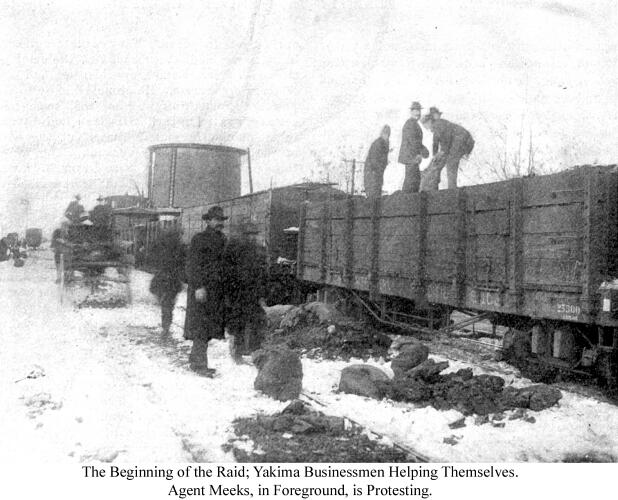
"If the railways are trying to give the people an 'object
lesson,'" remarked the prominent citizen, "why I guess
Yakima can establish a little kindergarten for the railways."
And next day North Yakima, Washington, sallied forth, held
up and confiscated a long trainload of Northern Pacific coal—and
paid for about one-third of it.
The railway's monetary loss is regarded lightly by some of
the citizens. "It's a small fine for the company's neglect
and general cussedness," but the city's honorable business
men regret the moral effect of this feature of the historic raid,
and its results to the reputation of the town.
It is not the purpose of this article to throw more bricks
at the railways, though it may shy a peanut shell or two at both
sides. But the story of the picturesque episode and its causes
is interesting and rather instructive.
North Yakima is one of the finest types of Northwestern towns.
It was built by irrigation. Seventeen years ago most of its site
and the wide sweep of surrounding valley was sagebrush and bunchgrass.
Then came the Sunnyside ditch (a Northern Pacific enterprise),
which spread a portion of the waters of the Yakima over many thousands
of acres of "volcanic ash" soil—richest and deepest
in the country. Settlers were invited to come in and take up tracts
of ten acres, and upwards, on long time and easy payments. They
came, and soon the desert vanished. In its place bloomed apple,
peach and prune orchards, wonderful fields of alfalfa and record-breaking
crops of the finest potatoes in the world.
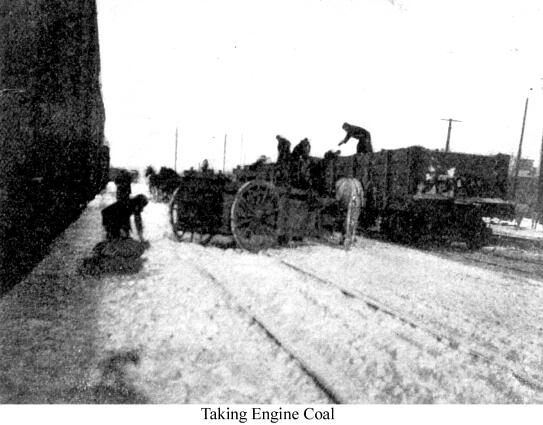 The town,
at first a "wide open" frontier hamlet, rapidly developed
into the present-day beautiful city of 10,000 inhabitants, splendid
schools, high license, Carnegie library, numerous prosperous banks,
good hotels, substantial mercantile houses and fine church structures.
Its wide streets, excellent light and water systems, well-edited
daily newspapers and other advantages, are also the pride of its
people and of the agricultural population of some 15,000 tributary
to it. The town,
at first a "wide open" frontier hamlet, rapidly developed
into the present-day beautiful city of 10,000 inhabitants, splendid
schools, high license, Carnegie library, numerous prosperous banks,
good hotels, substantial mercantile houses and fine church structures.
Its wide streets, excellent light and water systems, well-edited
daily newspapers and other advantages, are also the pride of its
people and of the agricultural population of some 15,000 tributary
to it.
There is no suggestion of the untamed, wide-sombreroed, jingling-spurred
West about this peaceful community that almost wrecked a train
and freebooted a thousand tons of coal.
Some time ago the Federal Government took over the original
ditch that began the development of the Yakima Valley, extending
and including it with a larger irrigation system. This, together
with certain private projects now under way, or in contemplation,
means further great increase and prosperity to Yakima with the
extension of its tributary agricultural and horticultural region.
Naturally the Northern Pacific looks with a jealous eye upon
the threatened encroachment of the mysterious North Coast Railway
into this hitherto exclusively Northern Pacific territory. It
has fought, and is fighting with every device and weapon in the
brains and hands of its able counsel, the right-of-way progress
of the North Coast.
But the ungrateful inhabitants view with anything but alarm
the approach of a competing line. "We shall have plenty of
cars, then," they say, "to bring us coal and carry our
products to market."
At the time this article is being written many scores of thousands
of tons of alfalfa are heaped in stacks, and sixty per cent of
the great potato crop is stored in pits, shrinking daily in weight,
while prices are highest, because the farmers cannot get cars.
Hence the popular party cry at the last election was "Hooray
for the North Coast Road!" It boosted O. A. Fechter, banker,
into office as Mayor for the eighth time. Now many Yakima people
believe the Northern Pacific feels vindictive on this score, and
tried to get even on the town by cutting down its fuel supply.
The officials scoff at this as an absurdity, and point to the
very general shortage of coal elsewhere.
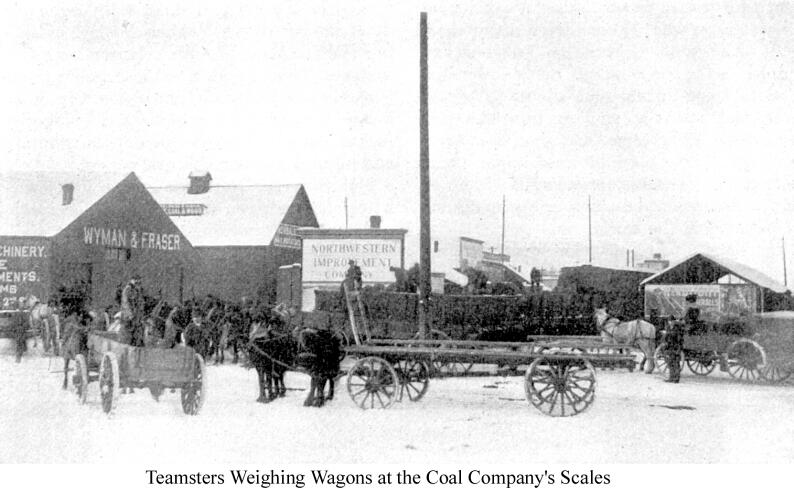
But Yakima always has had to depend almost entirely upon the
Northern Pacific for its fuel. The Roslyn mines, some sixty-seven
miles away, are owned by the Northwestern Improvement Company,
a Northern Pacific allied corporation, that in the past has always
supplied an abundance of good coal at reasonable prices to the
Yakima Valley towns, as well as elsewhere through the Pacific
Northwest.
Last Summer the company announced that it had decided to get
out of the commercial coal business; that the entire output of
its mines would be required for its own use in the train service.
"We notified all our leading customers six months ago,"
explained an official to me at the head offices of the Northern
Pacific at Tacoma, "that we should discontinue the trade.
They have had ample notice and could have avoided a shortage had
they taken time by the forelock and purchased a supply from other
sources. You know the old school-book fable of the two squirrels?
The gray squirrel said, 'I will labor and gather and store nuts
while the sun shines and the days are warm,' but the red squirrel
said, 'This is the time to play—I can labor by and by'; but
by and by the winds blew and the snow drifted, and the red squirrel
shivered and hungered and perished. Now these people could have
got coal from the Crows Nest mines north of Spokane, or from Wyoming,
though that's pretty far," he admitted, "or from the
Pacific Coast Company, The mines at Renton, Franklin, New Castle,
Carbon Hill, Cumberland. Burnett or the Occidental. Yes, sir,
the dealers of the Northwest should have laid in a supply in the
Summer."
"But," retort the dealers and consumers, "why
should we unexpectedly be required to order coal months in advance
of our needs? It's the railways' business to furnish cars as we
want them. They have done so in the past—how were we to know
they would be short this Winter?"
Some railway officials have volunteered statements to the effect
that so much agitation against the railways has had a damaging
effect upon the business, and hinted that had the Government and
various state legislatures let them alone, there would have been
less trouble. Many people have pounced upon this as an indication
that something like a vast conspiracy exists for the purpose of
giving the country an "object lesson" of its dependence
upon the good will of the railways. If this be true in the matter
of fuel, the roads have been hoist by their own petard in many
cases, for their reports reveal serious losses because of shortages
of company coal on almost every division.
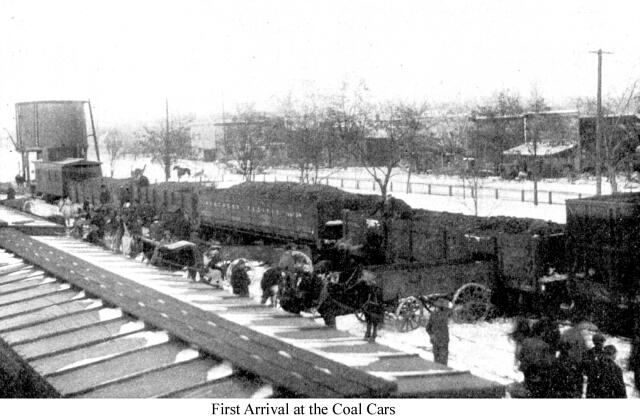 On all sides
one hears statements to the effect that in the effort to control
the coal supply and gather the profits of the trade unto themselves,
the railways have frozen out private coal enterprises, refused
to build spurs to private mines, or to provide sidings and cars
and otherwise encourage the development of independent mines;
that had the companies stuck exclusively to their proper business
of providing transportation, and had consequently reached out
to encourage new sources of freight, coal would be cheaper and
doubly abundant, for there are vast bodies of untouched coal in
many parts of the Northwest. But the roads retort that they have
had to get control of mines to provide for their own needs. On all sides
one hears statements to the effect that in the effort to control
the coal supply and gather the profits of the trade unto themselves,
the railways have frozen out private coal enterprises, refused
to build spurs to private mines, or to provide sidings and cars
and otherwise encourage the development of independent mines;
that had the companies stuck exclusively to their proper business
of providing transportation, and had consequently reached out
to encourage new sources of freight, coal would be cheaper and
doubly abundant, for there are vast bodies of untouched coal in
many parts of the Northwest. But the roads retort that they have
had to get control of mines to provide for their own needs.
A premature compliance with the new Federal regulation divorcing
the railways from the interstate coal trade may have had something
to do with the trouble. Then, too, bad management is charged.
Instead of equipping themselves to carry more freight, the railways
have been applying profits to paying dividends on heavily watered
stock or have been using their means to buy each other up. "The
money it cost to get Fish out of the Illinois Central would have
hauled a lot of Nebraska wheat to market." The Interstate
Commerce Commission has reported that loaded cars stand "from
two to twenty days at the points, of origin"; cases of "empty
cars lost in congested terminals, or lying unused, sometimes in
solid trains, for equal lengths of time; of engines broken down
from overwork; of trains torn in two by heavy loads; of train
crews working extremely long hours without rest, although making
only ordinary mileage; of cases being common in which loaded trains
took twenty days or more to be moved 250 miles."
Whatever be the causes, the Northwest has encountered an appalling
fuel shortage accompanied by a season of almost unprecedented
cold weather. Yakima was not the first town to confiscate coal
from cars destined elsewhere. Driven to desperate straits two
or three other small points had already startled the railway companies
by seizing coal, in one case an entire car, but it was done in
an organized and orderly fashion, the coal being properly weighed
and duly paid for.
At Yakima the pinch began to be felt as far back as the heavy
floods, which absolutely stopped all train service during the
latter half of November. Thereafter coal arrived intermittently
in small lots, a car or two at a time. Through all the years in
which the company has been selling coal to this large town it
has constructed no bunkers or storage bins here; the consumers
are obliged to back their wagons up to the siding and shovel directly
from the cars. This is a measure of economy, for coal loses weight
from the time it is out of the mine; and the plan has been followed
to keep only enough coal on hand in cars to supply immediate needs.
Consequently any loss of service or shortage of cars is promptly
felt.
Through December, Yakima people and the farmers far and near
had to form in line with wagons day after day, moving up, one
by one, to the car, only to receive at times a maximum allotment
of 500 pounds. This line-up began as early as 3 o'clock A. M.,
and often stretched out many blocks in length. As teamsters charged
from fifty cents to one dollar an hour for this waiting time,
the cost of coal was frequently doubled to the shivering householder.
Complaints and questions assailed the company, and the reply
was usually "car shortage." But reports came to Yakima
of empty coal cars idling at sidings in many places near; and
once, eighteen "empties" stood on a Yakima sidetrack
for several days—quite long enough, said the citizens, to
have run up to the mines, loaded and returned.
So, as conditions grew worse, the people became more skeptical
and indignant. The weather waxed colder and they took to their
kitchens to economize with cookstove heat only. Boxes, old boards
and backyard fences—every scrap that could serve for fuel—went
to drive away the shivers.
One day several cars of engine coal arrived. This is not of
quite so good quality as the usual commercial grade, and the company
says that its Yakima customers turned up their noses at it. Yakima
denies this and suggests that the company may have had a call
for it elsewhere, and therefore took it away before the town had
a fair chance at it. At any rate, the coal of the raided trains
was of the inferior grade, and the town seems to have made no
complaint about that.
The pinch became more bitter—actual suffering was experienced
by at least 1,500 families. At last, January 6, with the east
wind whistling through the icy streets, a committee of citizens
visited the Mayor at his office in his bank. As a result the following
telegram, signed by Mayor Fechter, Sheriff Grant and Chief of
Police Cayou, was sent to Vice-President Levy at the Northern
Pacific office at Tacoma:
Prompted by desperate conditions,
an organization of more than a hundred people was formed here
today for the purpose of seizing and appropriating the first shipment
of coal, large or small, the company attempts to haul through
North Yakima. Suffering actually exists. Not a pound of coal is
for sale. At least ten cars are needed to relieve the present
conditions, and as much more daily while the cold weather continues.
May we expect relief?
That same day the Yakima Herald had published a very
vigorous article setting forth conditions and mentioning the probability
of summary means being taken by the citizens to secure fuel.
Vice President Levy's reply to the mayor's telegram stated
that a dozen cars were in transit to Yakima, but the dispatch
was not received until late next day. Meanwhile the town had carried
out its threat, seizing twenty-one cars of coal January 7.
Newspaper reports indicated that the affair was sudden, spontaneous,
leaderless. Now, even though driven by dire stress, a modern American
town of churches, banks, culture and commerce, does not suddenly
rise up and take that which belongs to another, without the counsel,
example or leadership of at least one man.
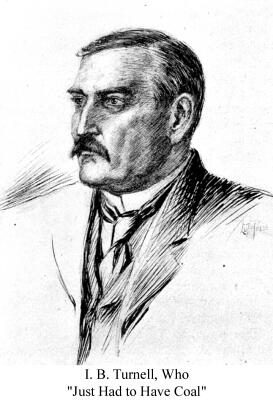 Somehow, from
the fact of the telegram to Mr. Levy, and other features of the
news reports of the affair, I had the notion that the Mayor must
be this unique and determined personage; so Mr. O. A. Feebler,
eight times Mayor of Yakima, was the first citizen whom I visited
to get the story. He did not welcome me; he seemed a trifle embarrassed.
The railway company was not to blame, he said, the people were
not to blame—it was just a spontaneous affair; the people
had to have coal; they were mostly farmers from the surrounding
country, anyway; the railway had done its best—nobody could
be blamed for anything. Suddenly he became suspicious: Somehow, from
the fact of the telegram to Mr. Levy, and other features of the
news reports of the affair, I had the notion that the Mayor must
be this unique and determined personage; so Mr. O. A. Feebler,
eight times Mayor of Yakima, was the first citizen whom I visited
to get the story. He did not welcome me; he seemed a trifle embarrassed.
The railway company was not to blame, he said, the people were
not to blame—it was just a spontaneous affair; the people
had to have coal; they were mostly farmers from the surrounding
country, anyway; the railway had done its best—nobody could
be blamed for anything. Suddenly he became suspicious:
"Don't you put my name in
your article," said he; "I wont have it. I'll sue you
for damages if you mention me."
Clearly this was no leader, at least not the leader I was seeking.
Also, clearly, the Mayor expected and dreaded criticism. Why?
Others informed me. He had failed to meet a crisis for which he
had ample time to prepare. Not that he was expected to stop the
raid, but he made no attempt to regulate it; to provide that the
seized coal should be properly apportioned to all alike, so that
the poorest should have equal chance with those owning or able
to pay for teams and help; also to see that all should pay the
proper price for what they took. Because of this neglect more
than half—perhaps two—thirds of the coal was stolen.
Yakima's business men do not justify this—they regret
it. They feel that the confiscation, while lawless, was excusable;
but they know that the stealing side of it cannot but have an
unfortunate moral effect. They are not proud of the example to
the young of the town.
When appealed to at the beginning, to try to regulate the raid,
the Mayor had said, "I can have nothing to do with it."
Perhaps he felt with the Sheriff and Chief of Police, that by
keeping out of it he could, in a measure, escape responsibility.
So one had to look elsewhere for the man in the affair.
I talked with the railway company's employees at the yards, and
they mentioned I. B. Turnell.
"He set the example—he's a bad one—he raided
coal cars on his own account here two or three times before this
last raid; he's the man that started the crowd to dumping those
coal cars."
So I made inquiry about Mr. Turnell among Yakima people. "He's
all right," they said. "An old railway man; now he's
proprietor of one of our hotels. You can depend upon anything
he tells you."
Almost everybody is ready to abuse the railways privately,
but when it comes to utterance for possible publication, many
business men are curiously shy. "I don't want you to say
I said that," one hears; "you see I have had favors
and may want another sometime—I can't afford to have the
company down on me."
I. B. Turnell was a refreshing exception. A big, tall, two-fisted
American, very square of jaw, very wide between the eyes, and
very wide across the shoulders, he looks you in the face with
a jolly smile, and gives you his views evidently without reservation
because of man, God or the devil. The son of pioneers of Wisconsin—that
state of La Follette and railway legislation—he became a
brakeman in his youth. Having been slightly crippled in an accident,
he studied telegraphy, and thereafter continued in the transportation
service as station agent and telegraph operator. At one time he
managed a railway coal mine in Illinois. Always an enthusiast
in railway matters, he is probably one of those railway men who
have, through luck, lack of opportunity, or perhaps too ready
outspokenness, just missed promotion. Eventually he came to Yakima
as night operator at the Northern Pacific station. His wife opened
a modest boarding-house which prospered so well that the pair
at last resolved to stake their savings and their future in an
hotel enterprise.
They were succeeding beyond their expectations when the coal
shortage began to threaten them with ruin. Having invested their
all, they did not secure a large stock of coal in advance of the
famine, not dreaming of being unable to get what they wanted as
needed. Using from one to one-and-a-half tons a day, when coal
arrived in single carloads and consumers had to wait all day in
line, only to get sometimes not more than 500pound portions, the
Turnells became anxious. To be without coal meant to be without
guests, and without the latter, no means to pay rent or help.
Finally, when but a day's supply remained at his shed, Turnell
visited Freight Agent Meeks, of the railway company, and Agent
Hessey, of the coal company. They could offer him no other consolation
than to say that the Northern Pacific was doing the best it could.
Thereupon Mr. Turnell took a look around the yards and saw a carload
of engine coal resting quietly upon a siding. He hurried over
to the drayage company and said:
"I want a couple of your best teams to haul coal from
a car I have out here."
Before being discovered by Agent Meeks he had secured two full
loads. Seeing Mr. Turnell thus engaged, other teams crowded up:
"That your coal?" asked the drivers.
"Looks like it—doesn't it'?" returned the facetious
hotel man.
"Sell us some?"
"Not a pound."
"How can we get some?"
"By doing as I am doing."
Thereupon, as Turnell's team drove away, the others started
to help themselves; but by this time Agent Meeks had been warned
and he stopped them with resolute language. However, that afternoon
four cars of commercial coal were set off on the siding, and the
town rejoiced.
"I have always found," said Mr. Turnell, "that
when you can't get attention by talking soft, talk hard or do
something to make the other fellow mad, and he'll begin to take
notice."
Securing his weight slips from the scales, Turnell went over
to the Northwestern Improvement Company's office and paid the
surprised agent for the coal he had taken.
That happened December 14th. Thereafter, until the holidays,
a fair supply of coal was furnished Yakima; then the company shut
down on the shipments. On January 3d the hotel man again found
himself in desperate straits. Again he found it impossible to
buy coal; again he raided a car of railway coal. He had secured
one big dray load, and was rapidly getting another, while other
teams gathered anxiously around. Suddenly Agent Meeks appeared.
"What are you doing?" he demanded.
"Shoveling coal," replied Turnell, pausing to wipe
his brow.
"You're stealing it; stop or I'll have you in jail."
"Go ahead and get your warrant; I'll go to jail,"
returned Turnell, resuming work.
"Stop," shouted the resolute Meeks, now addressing
the drayman, "or I'll have you prosecuted."
In dismay the drayman dropped his shovel.
"Now put back what you have on your wagon."
The drayman hesitated.
"Drive off," ordered Turnell, "I've got enough,
anyway."
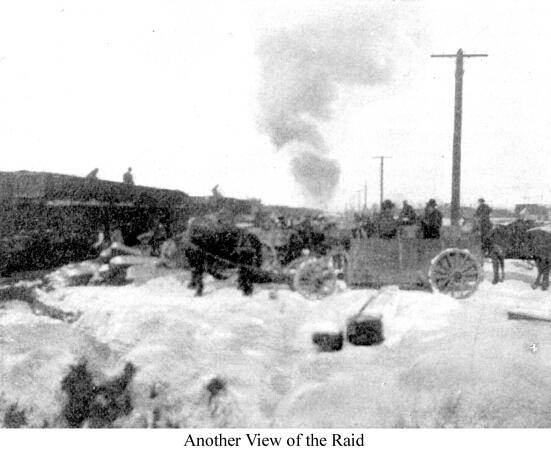 "Don't
you dare to do so," cried Meeks. Again the drayman hesitated.
Thereupon the lawless and square-jawed Mr. Turnell jumped upon
the box and drove the team away to the scales himself. The following
Sunday morning, rising very early, he discovered that the company
was about to set a car of commercial coal upon the siding. Without
waiting for a line to form, or the agent of the coal company to
arrive, he helped himself to six dray loads. "Don't
you dare to do so," cried Meeks. Again the drayman hesitated.
Thereupon the lawless and square-jawed Mr. Turnell jumped upon
the box and drove the team away to the scales himself. The following
Sunday morning, rising very early, he discovered that the company
was about to set a car of commercial coal upon the siding. Without
waiting for a line to form, or the agent of the coal company to
arrive, he helped himself to six dray loads.
"What!" cried Mr. Hessey, when Mr. Turnell tendered
payment, "you got away with six loads when there's hundreds
waiting their turn at it? Do you know what I think of you—you're
a hog—that's what you are."
Mr. Turnell smiled.
"Perhaps you don't care what I think of you," persisted
the indignant agent.
"Young man," retorted Turnell, "be calm—wanted
coal." Afterwards he remarked, "If other people were
willing to be put off and be doled out to until they were ruined
or frozen, I was not. I know there has been no legitimate excuse
for the coal shortage and car shortage everywhere. I believe that
greed and mismanagement from headquarters back in St. Paul and
New York are at the bottom of it. Every subordinate official has
had Jim Hill's motto, 'Maximum load with minimum haulage expense,'
drilled into them until it has become a crime to run a train of
less size than will absorb every ounce of the engine's power.
Consequently there has been nothing but trouble and delay, and
cars take three or four times the number of days to make hauls
that used to be required for the same trips." In which statement
Mr. Turnell repeated in effect what the Interstate Commerce Commission
has reported.
It was on the day following Mr. Turnell's last "raid"
that the committee of citizens visited the Mayor, and the warning
telegram was sent to the Northern Pacific headquarters at Tacoma.
When members of this committee asked the Mayor's advice about
action in case coal should not be forthcoming from the railway
company, he replied, smilingly
"You know that it wouldn't be right for me to advise breaking
the laws."
"But you don't expect us to let our families freeze?"
"No," replied the Mayor, "and under the circumstances,
no jury would convict you for taking the coal if you can get it."
Next day the crowd of drays began to assemble about the railway
yards before daybreak. Noon came and no reply had yet been received
from Vice-President Levy.
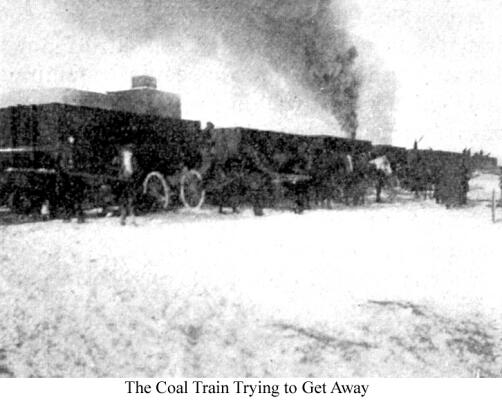 All day the
crowd increased. Farmers and orchardists from many miles out of
town foregathered with townspeople, stamping their chilled feet,
rubbing aching ears, swapping stories of hardships suffered at
their homes, or exchanging comments. All day the
crowd increased. Farmers and orchardists from many miles out of
town foregathered with townspeople, stamping their chilled feet,
rubbing aching ears, swapping stories of hardships suffered at
their homes, or exchanging comments.
"That man Turnell's been getting coal," some one
remarked. "We ought to have as much gall as he has."
Shortly after 2 o'clock a freight pulled in from the west and
shunted a couple of coal-laden cars upon the coal company's siding.
"Look at that!" cried the crowd, "there's only
a sackful apiece for us."
But the teams peacefully lined up for loads, and Coal-Agent
Hessey had just set about its distribution, when the shout went
out:
"There's a coal train up the track!"
Scores of wagons immediately raced for it, but as the train
proved to be a long one, there was room for all. Every dray, express
and lumber wagon in town was pressed into service, while men and
women ran from one teamster to another to engage the hauling of
small portions of the precious loot.
The engineer and fireman had uncoupled the engine from the
train and run it down to the station while they went to lunch,
so the rapidly increasing crowd was making the coal fly almost
before the railway people were aware. Says the Yakima Herald:
Hundreds of men and boys, women
and a few small girls sailed into the piles that were thrown off
onto the ground and filled boxes, baskets, sacks and even lard
pails and handkerchiefs, but all women who came were helped until
they had all they could carry.
Comparatively a small showing was made in the quantity taken,
however, when the engine backed down, coupled on and started the
train southward. Wagons were quickly driven across the track,
and the crowd gathered begging, pleading, warning and threatening
the engineer, and trying to get him to set the coal cars in on
another siding. He refused, and steamed slowly down the track,
intending to pull out at a rapid gait as soon as the siding was
cleared.
"Dump the cars!" shouted a man. Some say it was Turnell,
but I could not definitely learn who struck off the patent dumping
control of the first car. When the train began to move most of
the crowd scattered, but a considerable number remained on the
cars. These quickly freed the adjustable bottoms of ten of the
cars, and the coal poured down upon the track and along the sides.
The train stalled directly opposite the station. A quartermile
of track was littered deep with coal and the people gathered about
it like flies along a streak of honey.
The engineer managed to get away then with about half his train,
pulling it down the track to another siding. But in a few minutes
another raid had started, and much coal was taken before the harrassed
engineer again got under way and took his train further on still
to Yakima City. The spirit of loot was rampant, and Yakima City
swarmed out like a hive of bees. Here at last the railway people
took charge of the cars, and sold coal to all who came.
Meanwhile another coal train had pulled to the yards shortly
after the first had been stalled at the station. It, too, was
raided with a whoop! and eleven more cars were dumped upon the
track.
The news had spread all over town and the people "come
a-running." Business men and laborers, rich and poor, young
and old, labored with quiet enthusiasm and thorough good nature.
Some people were in a panic lest the hundreds of tons would be
gone before they could get a share. One man was seen to remove
his overalls, tie a cord about each lower extremity, then filling
the improvised sack to the waistband, hurry home joyfully with
the load.
Early in the raid a quick-witted railway employee turned in
a fire alarm, and the Yakima department dashed out across the
tracks. Scarce one of the busy looters looked up from his work,
however, and the ruse was without effect. At last, after dark,
the authorities took charge, and thence on all coal was weighed
and accounted for. That night saw cheer in every Yakima home and
farmhouse round about.
Next day many more cars came in, and, ever since, Yakima is
said to have enjoyed the distinction of having more coal per capita
than any other town away from the mines in the Northwest.
"If you can't get attention by talking soft," says
Mr. Turnell, "talk hard or do something, and they'll take
notice."
Stories Page | Contents Page
|







